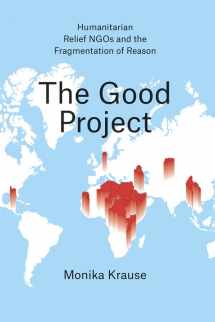
The Good Project: Humanitarian Relief NGOs and the Fragmentation of Reason
ISBN-13:
9780226131221
ISBN-10:
022613122X
Edition:
1
Author:
Monika Krause
Publication date:
2014
Publisher:
University of Chicago Press
Format:
Hardcover
240 pages
FREE US shipping
Book details
ISBN-13:
9780226131221
ISBN-10:
022613122X
Edition:
1
Author:
Monika Krause
Publication date:
2014
Publisher:
University of Chicago Press
Format:
Hardcover
240 pages
Summary
The Good Project: Humanitarian Relief NGOs and the Fragmentation of Reason (ISBN-13: 9780226131221 and ISBN-10: 022613122X), written by authors
Monika Krause, was published by University of Chicago Press in 2014.
With an overall rating of 4.2 stars, it's a notable title among other
books. You can easily purchase or rent The Good Project: Humanitarian Relief NGOs and the Fragmentation of Reason (Hardcover) from BooksRun,
along with many other new and used
books
and textbooks.
And, if you're looking to sell your copy, our current buyback offer is $0.3.
Description
NGOs set out to save lives, relieve suffering, and service basic human needs. They are committed to serving people across national borders and without regard to race, ethnicity, gender, or religion, and they offer crucial help during earthquakes, tsunamis, wars, and pandemics. But with so many ailing areas in need of assistance, how do these organizations decide where to go―and who gets the aid? In The Good Project, Monika Krause dives into the intricacies of the decision-making process at NGOs and uncovers a basic truth: It may be the case that relief agencies try to help people but, in practical terms, the main focus of their work is to produce projects. Agencies sell projects to key institutional donors, and in the process the project and its beneficiaries become commodities. In an effort to guarantee a successful project, organizations are incentivized to help those who are easy to help, while those who are hardest to help often receive no assistance at all. The poorest of the world are made to compete against each other to become projects―and in exchange they offer legitimacy to aid agencies and donor governments. Sure to be controversial, The Good Project offers a provocative new perspective on how NGOs succeed and fail on a local and global level.


We would LOVE it if you could help us and other readers by reviewing the book
Book review

Congratulations! We have received your book review.
{user}
{createdAt}
by {truncated_author}


